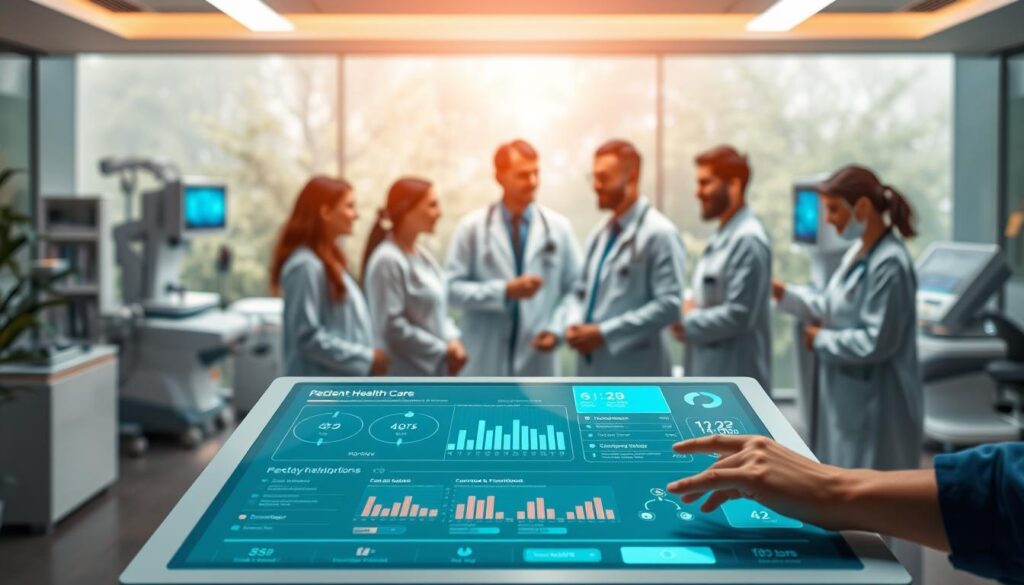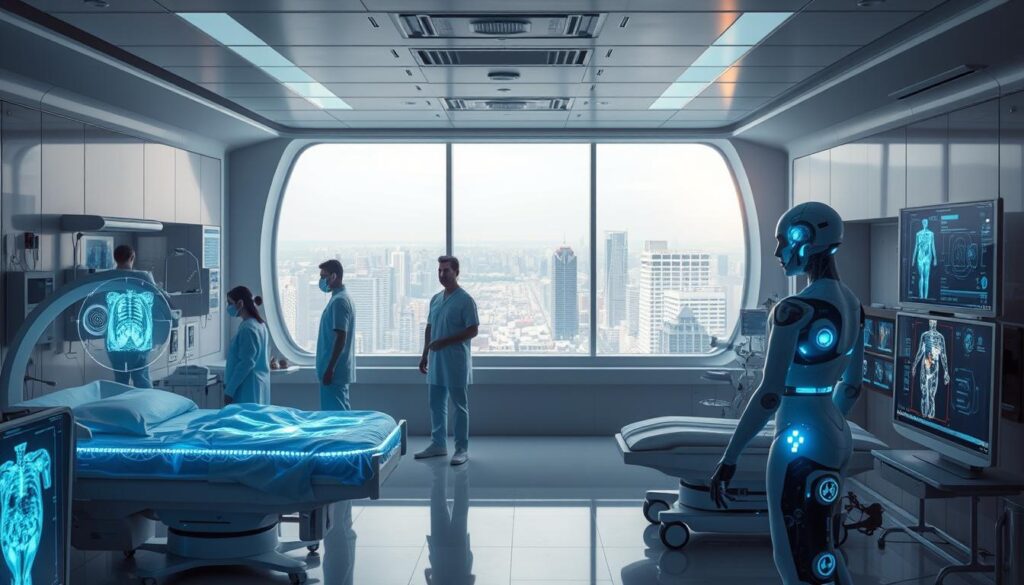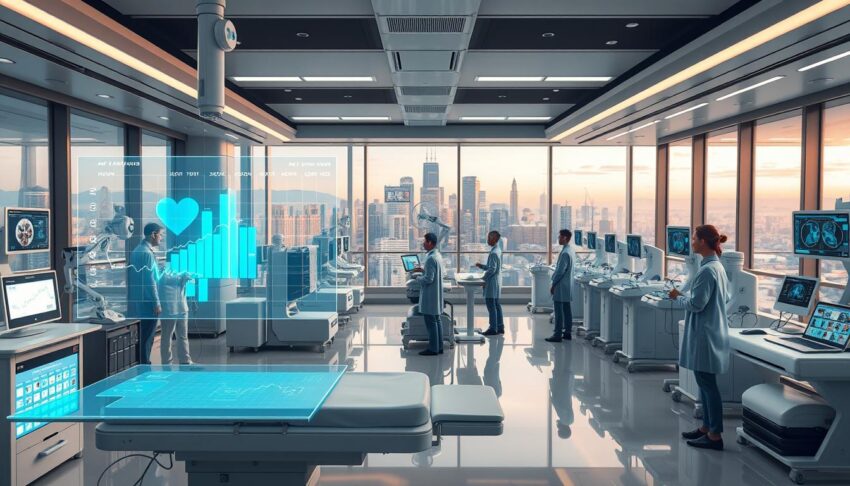What if the key to better patient care is in the technology we think is just a trend? Artificial intelligence in healthcare is changing how doctors diagnose and treat patients. This change is big and important for the future of health care.
Hospitals like Mayo Clinic and Mount Sinai are leading this change. They use AI to make health care better. AI helps doctors work more efficiently and make better choices for patients.
Key Takeaways
- AI in healthcare significantly improves patient outcomes through advanced diagnostics.
- Major healthcare institutions are leading the way in AI implementation.
- Workflow efficiencies are enhanced by integrating artificial intelligence.
- Most hospitals in the U.S. are adopting AI technologies rapidly.
- AI assists healthcare professionals in making informed decisions.
The Role of AI in Modern Healthcare
AI has changed healthcare a lot. It helps doctors care for patients better. It looks at big data from electronic health records (EHRs).
This makes doctors guess health problems before they happen. It helps them take care of patients in new ways.
AI also makes healthcare work better. It helps doctors by doing tasks for them. This lets doctors focus on what's most important.
AI gives doctors good ideas to make decisions. This means patients get the right care, just for them.
Places like the Cleveland Clinic are using AI. They see better results for patients. This shows AI is very helpful in healthcare.
Exploring Artificial Intelligence in Healthcare
Artificial intelligence is changing healthcare in big ways. It's used for things like robotic surgeries and better imaging. Companies like IBM are leading the charge with their Watson Health project.
Natural language processing helps doctors understand complex data. It makes patient notes easier to write. Computer vision in radiology helps doctors see images clearly and fast, leading to quicker diagnoses.
More and more places are using AI in healthcare. It makes things run smoother and helps patients get better faster. The future looks bright for AI in healthcare.
Machine Learning in Medicine
Machine learning in medicine is changing healthcare. It helps doctors understand and use big data better. Knowing how these algorithms work is key.
They help doctors make better choices by looking at health data. This makes care more precise.
Understanding Machine Learning Algorithms
There are two main types of machine learning algorithms. Supervised learning uses labeled data to predict things. It's good at knowing what will happen next.
Unsupervised learning finds patterns in data without labels. It shows connections that are hard to see. This helps predict diseases and improve treatments.
Applications of Machine Learning in Diagnosis
AI is changing how we find and treat diseases. For example, it helps predict diabetes outcomes. It also helps in cancer care by guessing how it will grow.
Google Health is using AI to make breast cancer detection better. It's making a big difference.
Transforming Patient Experience with Personalized Healthcare Solutions
Personalized healthcare is changing how we see doctor visits. AI helps make care fit each person's needs. Tools like chatbots give patients quick help and health tips.
For example, reminders for medicine help patients stick to their plans. This leads to better health. Ada Health shows how AI makes care more personal. It makes patients happier and more involved in their health.

Innovative Healthcare Technology Driving Change
New healthcare tech is changing how doctors work. It brings new tools to help patients and make things run smoother. This tech makes care better and helps people stay healthy.
Emerging Technologies in Healthcare AI
AI and blockchain are leading this change. AI helps doctors by doing paperwork. Blockchain keeps patient data safe and open. These techs show how healthcare is getting a big update.
Integration of Wearables and AI
Wearables like fitness trackers are key now. They send health info to AI for checking. This lets doctors catch problems early. It also makes health care easier to get.
| Technology | Application in Healthcare | Benefits |
|---|---|---|
| Artificial Intelligence | Patient data analysis and predictive analytics | Improves decision-making and reduces errors |
| Blockchain | Secure patient information storage | Enhances data security and patient privacy |
| Wearables | Real-time health monitoring | Encourages proactive health management |
This tech world is always growing. It promises a future where caring for patients is better and easier. This is thanks to the mix of these new tools.
AI in Healthcare: Revolutionizing Diagnostics
AI is changing how doctors look at medical data. It makes reading tests more accurate and reliable. This is especially true for things like X-rays and tissue samples.
AI can look at pictures and data faster than doctors. This means doctors can find problems sooner and more often.
AI makes doctors work faster. For example, Zebra Medical Vision uses AI to make diagnoses quicker. This makes healthcare better and can save lives.
AI is getting better at looking at medical data. It uses special computer programs to find patterns. More hospitals are using AI to help doctors make better choices.
| Diagnostic Area | Traditional Method | AI-Driven Method |
|---|---|---|
| Radiology | Manual image interpretation by specialists | Automated image analysis with AI algorithms |
| Pathology | Microscopic examination by pathologists | AI-assisted image detection of anomalies |
| Cardiology | Stress tests and manual ECG analysis | AI-enhanced ECG interpretation for quicker results |
| Neurology | Assessment of neurological disorders through patient history | AI-based predictive modeling for early detection |
The future of healthcare is combining human skills with AI. As AI gets better, it will help doctors more. This will make healthcare safer and better for everyone.
AI-driven Healthcare Advancements
AI is changing healthcare a lot. It makes treatments better and easier for doctors. Now, doctors can make plans just for each patient. This helps patients get better faster.
Enhancements in Treatment Plans
Old ways of treating patients were not always right. AI helps doctors make plans that fit each person. This makes treatments work better and have fewer bad effects.
Hospitals like the Cleveland Clinic use AI. They make new ways to help patients get well.
Real-time Data Analysis and Decision Support
AI helps doctors make quick decisions. It gives them patient info right away. This helps doctors treat patients better and faster.
Tools like Epic Systems help a lot. They use data to guide doctors. This makes care even better for patients.
| Aspect | Traditional Approach | AI-driven Approach |
|---|---|---|
| Treatment Personalization | One-size-fits-all protocols | Customized plans based on patient data |
| Decision Support | Manual data review | Real-time analytics with AI assistance |
| Outcome Optimization | Limited adjustments based on feedback | Continuous monitoring and adjustment capabilities |
| Efficiency | Time-consuming processes | Accelerated workflows with AI integration |
Predictive Analytics in Healthcare
Predictive analytics is key in today's healthcare. It helps improve patient care and makes things run smoother. Doctors use special tools to look at lots of data and guess health problems before they start.
For example, looking at past patient data can show who might go back to the hospital. This helps doctors stop problems before they start. It also saves money. Hospitals that use this tech see happier patients and spend less money.
There are many areas where predictive analytics is very useful:
- It finds patients who might get sick before they do.
- It helps plan for the right amount of resources needed.
- It makes treatment plans that fit each patient's history.
The Institute for Healthcare Improvement says predictive analytics is very important. It helps with value-based care. As healthcare gets more tech-savvy, predictive analytics will be even more important for patient care.
| Application | Benefit | Impact on Healthcare |
|---|---|---|
| Patient Risk Assessment | Early intervention | Improved patient outcomes |
| Cost Reduction Strategies | Optimized spending | Enhanced financial sustainability |
| Personalized Treatment Plans | Increased treatment efficacy | Higher patient satisfaction |
Overcoming Challenges in Implementing AI in Healthcare
AI in healthcare has many challenges. AI barriers in healthcare need to be solved to use this tech fully. Keeping patient data safe is very important.
Old systems are another problem. Many places still use outdated tech. This makes it hard to use new AI tools.
Training staff is key. They need to know how to use AI tools well. This means education is very important. Everyone should have a say in using AI.
We need strong rules for AI in healthcare. Working together can help solve these problems. This way, we can use AI safely and well.
The Future of AI in Healthcare
Healthcare is changing fast with AI. New ways of caring for patients and making things run better are coming. AI is also getting better at working with patient data.
AI is becoming more important in healthcare. It will help doctors and nurses do their jobs better. It will also make sure AI is used in the right way.
AI will soon work better with current healthcare systems. This will make it easier to share patient information. It will help doctors and nurses help patients more.
Trends to Watch in Healthcare AI
COVID-19 has made healthcare change fast. Telehealth and remote monitoring are now more important. People are using AI to help with these changes.
- AI Ethics and Compliance: Making sure AI is fair and clear will be key.
- Interoperability Focus: AI will help systems work better together.
- Investment in AI Technologies: More money will go into AI for healthcare.
- Remote Monitoring and Telehealth: AI will help patients and doctors more.
- Predictive Analytics Growth: AI will help doctors make better choices.

Conclusion
AI is changing healthcare a lot. It helps with many things like finding diseases early and making care plans better. This summary shows how AI makes healthcare better for everyone.
AI helps doctors make better plans for patients. It uses data to help doctors make smart choices. This makes health care better and more efficient.
AI can predict health problems before they start. This helps doctors plan better. It also uses data in real time to help patients.
This is good for the future of healthcare. It means better care for patients and better work for doctors. Everyone needs to get used to these new tools.
AI is becoming a big part of healthcare. It will help make health services better. We need to keep working on using AI to help patients.
